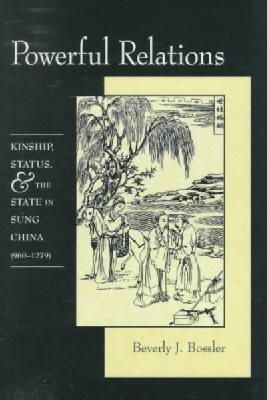
Powerful Relations: Kinship, Status, and the State in Sung China (960-1279) (Harvard-Yenching Institute Monograph Series)
Beverly Bossler
The realignment of the Chinese social order that took place over the course of the Sung dynasty set the pattern for Chinese society throughout most of the later imperial era. This study examines that realignment from the perspective of specific Sung families, using data on two groups of Sung elites—the grand councilors who led the bureaucracy and locally prominent gentlemen in Wu-chou (in modern Chekiang).
By analyzing kinship relationships, Beverly Bossler demonstrates the importance of family relations to the establishment and perpetuation of social status locally and in the capital. She shows how social position was measured and acted upon, how status shaped personal relationships (and vice versa), and how both status and personal relationships conditioned—and were conditioned by—political success. Finally, in a contribution to the ongoing discussion of localism in the Sung, Bossler details the varied networks that connected the local elite to the capital and elsewhere.
Product Details
About Beverly Bossler
Reviews for Powerful Relations: Kinship, Status, and the State in Sung China (960-1279) (Harvard-Yenching Institute Monograph Series)
Jennifer W. Jay
American Historical Review
The title here is telling: ‘relations’ is mostly about relatives—the bonds of kinship and marriage among the upper classes of the Sung dynasty and its implications for our understanding of society and polity. An impressive level of industriousness is reflected in the canvassing of widely scattered and difficult to read primary sources, but the author’s astute analysis of those sources is even more impressive, as she steers her own course through some difficult academic terrain.
Richard L. Davis
Bulletin of the School of Oriental and African Studies [UK]
Documenting the interaction among kinship, social status, and bureaucratic position in both Northern and Southern Sung China, Beverly Bossler’s book, a revision of her 1991 dissertation, makes an important contribution to continuing debate on the nature of the Sung elite. This debate has ramifications well beyond the boundaries of Sung studies since, as Bossler states, the social order established during the Sung ‘set the pattern for Chinese society throughout much of the later imperial period.’ By carefully examining biographical data on two groups—men who held high-ranking offices at the Sung court and men who were locally prominent but had little or no involvement in the bureaucracy—Bossler sets out to test and refine a reigning paradigm of Sung social history...The picture that comes into sharper focus with Bossler’s study is one in which the rise of a family—even within a single generation—could be due to the actions of one or two individuals. In this enterprise especially, she succeeds in conveying the ’very human stories’ she seeks to tell.
Linda Walton
Journal of Asian Studies
Bossler’s study of Sung social history is based on an analysis of the funerary inscriptions of northern Sung families that produced men who, as grand councilors, reached the pinnacle of political success, and on locally prominent people, mostly southern Sung, from Wu-chou (in modern Chekiang)...Meticulously documented and extensively annotated, this book deeply engages current scholarship and illuminates issues also of significance to students of later periods.
C. Schirokauer
Choice
